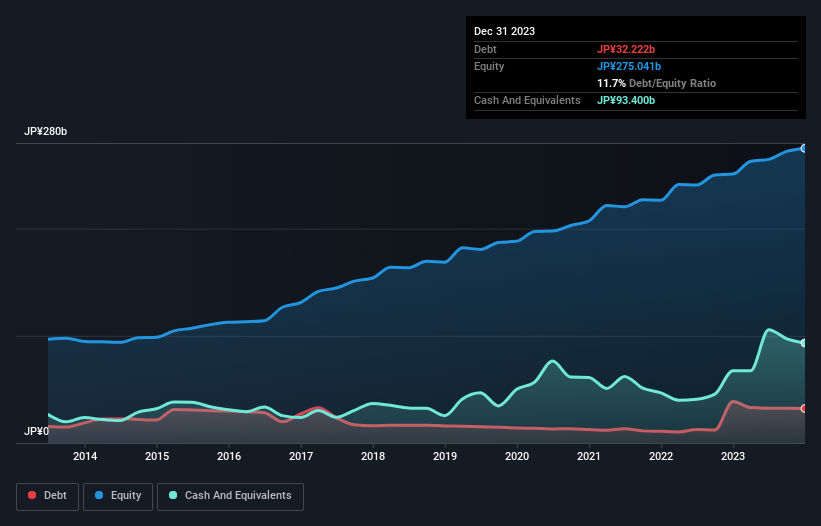David Iben put it well when he said, 'Volatility is not a risk we care about. What we care about is avoiding the permanent loss of capital.' When we think about how risky a company is, we always like to look at its use of debt, since debt overload can lead to ruin. We note that Kyudenko Corporation (TSE:1959) does have debt on its balance sheet. But should shareholders be worried about its use of debt?
When Is Debt A Problem?
Debt is a tool to help businesses grow, but if a business is incapable of paying off its lenders, then it exists at their mercy. In the worst case scenario, a company can go bankrupt if it cannot pay its creditors. However, a more common (but still painful) scenario is that it has to raise new equity capital at a low price, thus permanently diluting shareholders. Having said that, the most common situation is where a company manages its debt reasonably well - and to its own advantage. When we think about a company's use of debt, we first look at cash and debt together.
See our latest analysis for Kyudenko
What Is Kyudenko's Debt?
You can click the graphic below for the historical numbers, but it shows that Kyudenko had JP¥32.2b of debt in December 2023, down from JP¥38.7b, one year before. But it also has JP¥93.4b in cash to offset that, meaning it has JP¥61.2b net cash.

A Look At Kyudenko's Liabilities
According to the last reported balance sheet, Kyudenko had liabilities of JP¥177.7b due within 12 months, and liabilities of JP¥14.7b due beyond 12 months. Offsetting these obligations, it had cash of JP¥93.4b as well as receivables valued at JP¥128.3b due within 12 months. So it can boast JP¥29.3b more liquid assets than total liabilities.
This surplus suggests that Kyudenko has a conservative balance sheet, and could probably eliminate its debt without much difficulty. Succinctly put, Kyudenko boasts net cash, so it's fair to say it does not have a heavy debt load!
Also positive, Kyudenko grew its EBIT by 24% in the last year, and that should make it easier to pay down debt, going forward. There's no doubt that we learn most about debt from the balance sheet. But ultimately the future profitability of the business will decide if Kyudenko can strengthen its balance sheet over time. So if you're focused on the future you can check out this free report showing analyst profit forecasts.
Finally, while the tax-man may adore accounting profits, lenders only accept cold hard cash. Kyudenko may have net cash on the balance sheet, but it is still interesting to look at how well the business converts its earnings before interest and tax (EBIT) to free cash flow, because that will influence both its need for, and its capacity to manage debt. Over the most recent three years, Kyudenko recorded free cash flow worth 54% of its EBIT, which is around normal, given free cash flow excludes interest and tax. This cold hard cash means it can reduce its debt when it wants to.
Summing Up
While we empathize with investors who find debt concerning, you should keep in mind that Kyudenko has net cash of JP¥61.2b, as well as more liquid assets than liabilities. And it impressed us with its EBIT growth of 24% over the last year. So is Kyudenko's debt a risk? It doesn't seem so to us. Over time, share prices tend to follow earnings per share, so if you're interested in Kyudenko, you may well want to click here to check an interactive graph of its earnings per share history.
If, after all that, you're more interested in a fast growing company with a rock-solid balance sheet, then check out our list of net cash growth stocks without delay.
Valuation is complex, but we're here to simplify it.
Discover if Kraftia might be undervalued or overvalued with our detailed analysis, featuring fair value estimates, potential risks, dividends, insider trades, and its financial condition.
Access Free AnalysisHave feedback on this article? Concerned about the content? Get in touch with us directly. Alternatively, email editorial-team (at) simplywallst.com.
This article by Simply Wall St is general in nature. We provide commentary based on historical data and analyst forecasts only using an unbiased methodology and our articles are not intended to be financial advice. It does not constitute a recommendation to buy or sell any stock, and does not take account of your objectives, or your financial situation. We aim to bring you long-term focused analysis driven by fundamental data. Note that our analysis may not factor in the latest price-sensitive company announcements or qualitative material. Simply Wall St has no position in any stocks mentioned.
About TSE:1959
Kraftia
Engages in design, construction, and installation of power infrastructure construction business in Japan.
Flawless balance sheet average dividend payer.
Market Insights
Community Narratives



